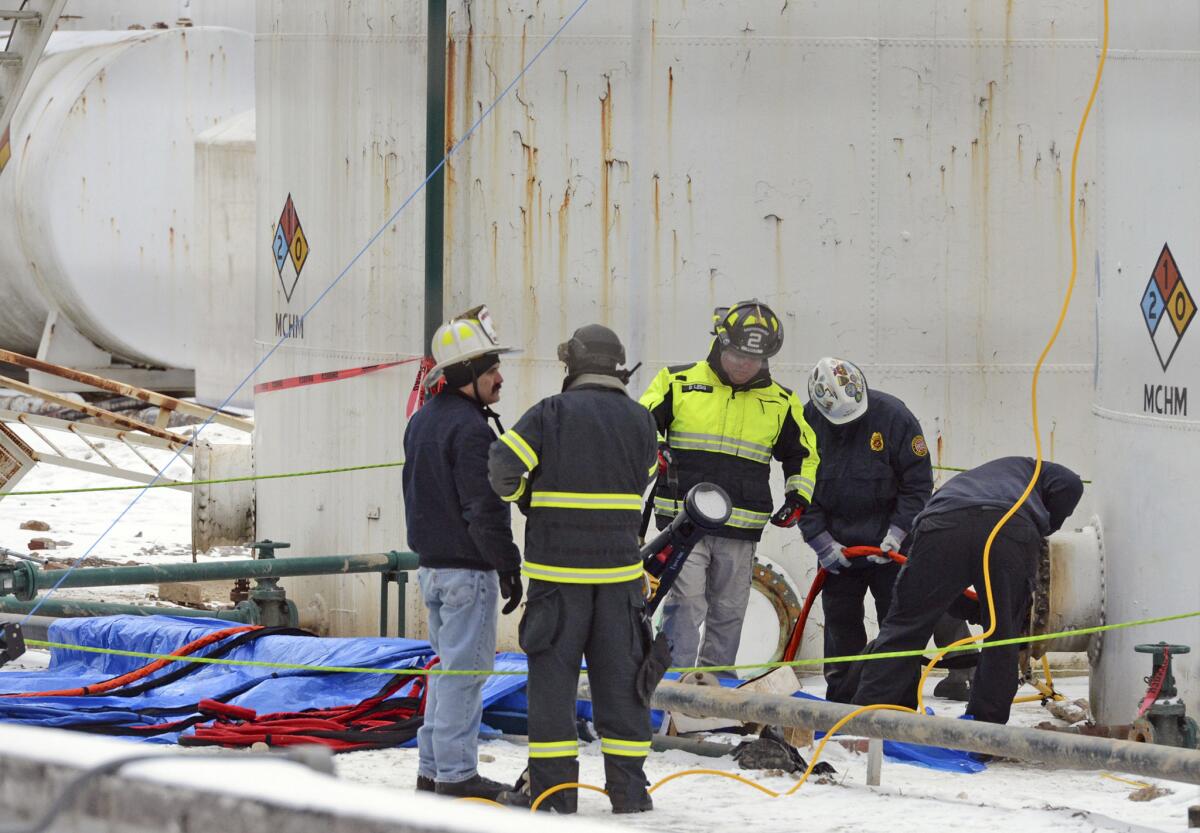Six indicted in chemical spill that fouled West Virginia river

- Share via
Six executives of a chemical company that spilled a coal-cleaning agent into a major West Virginia river in January, leaving 300,000 people without safe drinking water, were charged by federal authorities Wednesday with violating the Clean Water Act.
The charges came almost a year after a Freedom Industries chemical tank ruptured, dumping up to 10,000 gallons of the chemical MCHM into the Elk River and contaminating drinking water for nine counties in and around Charleston, W.Va. More than 400 people were treated at hospitals for symptoms they blamed on drinking tainted water, according to health authorities.
The Jan. 9 spill, in an area nicknamed “Chemical Valley,” was one of the worst environmental accidents in recent history in a state led by pro-industry officials opposed to many environmental regulations.
“They put an entire population needlessly at risk,” R. Booth Goodwin II, the U.S. attorney for the southern district of West Virginia, told reporters in Charleston while announcing charges contained in an indictment and a separate criminal information.
Four officials were charged in the indictment. Two others and Freedom Industries itself were named in the criminal information, which usually indicates that individuals charged are willing to cooperate with investigators.
Goodwin said Freedom Industries, which filed for bankruptcy eight days after the spill, and its executives failed to inspect or maintain the steel storage tank that ruptured and did not implement a required spill prevention and control plan. He called the spill “completely preventable” and accused company executives of “flagrant disregard of the law.”
“It’s hard to overstate the disruption that results when 300,000 people suddenly lose clean water,” Goodwin said. “This is exactly the kind of scenario the Clean Water Act is intended to prevent.”
Freedom’s former chief executive, Gary Southern, 53, was also charged with bankruptcy fraud, mail fraud and wire fraud in an alleged scheme to protect his $8 million in assets and misrepresent his role with the company. He faces up to 68 years in prison if convicted on all charges.
Robert Allen, an attorney representing Southern, called the indictment “cavalier.” He said he had filed a motion to recuse the U.S. attorney’s office in Charleston from the case. Allen said federal prosecutors were among those affected by the tainted water.
“They are victims,” Allen said. “How can they be independent or unbiased?”
The three other former Freedom executives indicted Wednesday were Dennis P. Farrell, 58; William E. Tis, 60; and Charles E. Herzing, 63. They each face up to three years in prison if convicted.
The company would face fines if convicted, Goodwin said. Negligent violations of the Clean Water Act are punishable by fines of $2,500 to $25,000 a day.
The indictment said the four executives “failed to exercise their authority to ensure that Freedom operated the … facility in a reasonable and environmentally sound manner.” The men “approved funding for only those projects that would result in increased business revenue for Freedom.”
Robert J. Reynolds, responsible for environmental compliance at Freedom’s Etowah Facility on the east bank of the Elk River, and Michael E. Burdette, the plant manager, were named in the criminal information. Goodwin indicated that both men were cooperating.
U.S. Atty. Gen. Eric H. Holder Jr. said conditions at the Freedom facility “were not only grievously unacceptable, but unlawful.”
The federal Chemical Safety Board is conducting a separate investigation.
The leaking MCHM, or 4-methylcyclohexane methanol, flowed into intake valves of the West Virginia American Water Co., located a mile and a half downstream from the ruptured storage tank. Residents were forced to line up for bottled water or at National Guard water tankers as authorities issued conflicting advisories about health effects of the little-known chemical.
On Jan. 13, just four days after the spill, authorities said the water was safe to drink, but then continued to distribute free drinking water. Thousands of residents refused to resume using tap water, among them the top public health official in Charleston.
Dr. Rahul Gupta, director of the Kanawha-Charleston Health Department, told The Times in a Jan. 31 interview that his family was not using local tap water.
“If you weren’t confused before, welcome to our world of confusion here,” Gupta said at the time. “People are naturally confused when they are told on the one hand that the water is safe, and on the other they are now redistributing water.”
Meanwhile, the federal Centers for Disease Control and Prevention warned pregnant women not to drink the water.
“Atmospheric tanks” like the one that ruptured are exempt from federal inspections because they are not under pressure, cooled or heated, according to the Chemical Safety Board. The tank was last inspected by state environmental authorities in 1999. The tank farm that included the ruptured tank was dismantled this year.
Chemstream Holdings of Pennsylvania, which bought Freedom on Dec. 6, 2013, a month before the spill, did not respond to a request for comment.
david.zucchino@latimes.com
More to Read
Sign up for Essential California
The most important California stories and recommendations in your inbox every morning.
You may occasionally receive promotional content from the Los Angeles Times.














